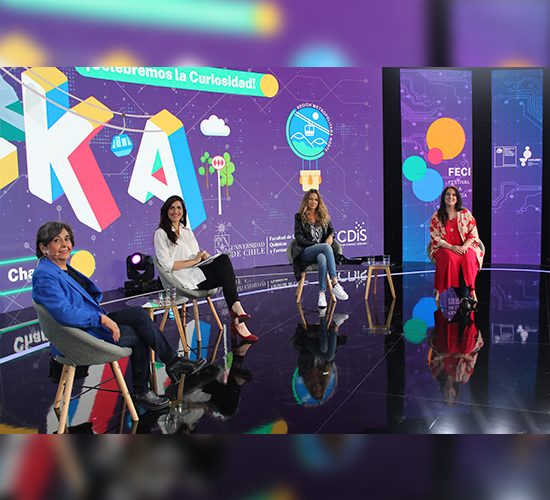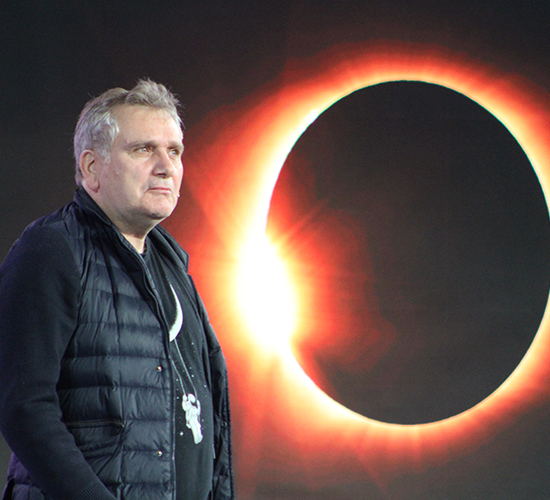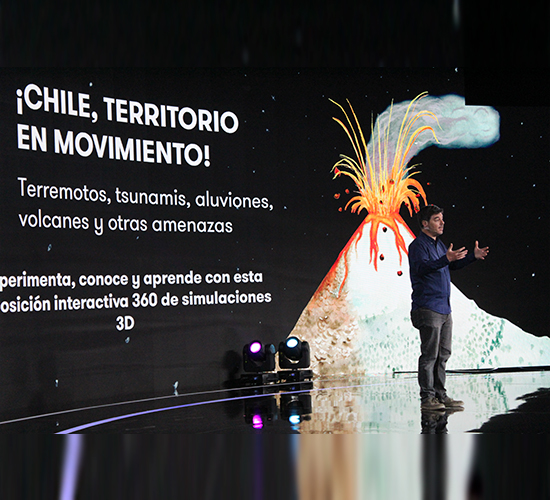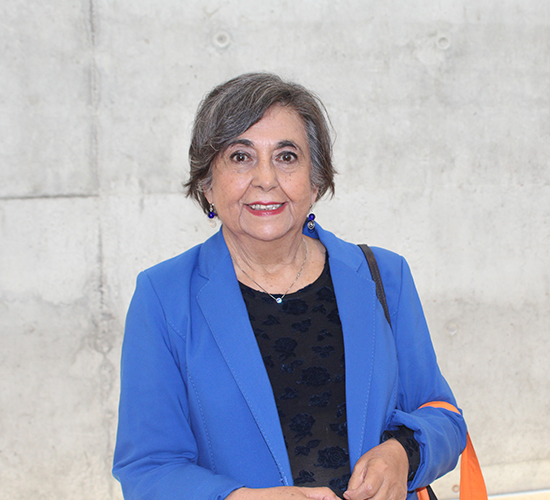Thousands of people celebrated curiosity about science with Explora RM North

As part of the Science Festival, nationally celebrated by Explora's Regional Partnership Programs, for five days the community enjoyed great free online activities focused on science issues and phenomena, Technology, Knowledge and innovation (CTCI).
Desde el 11 hasta el 15 de noviembre, girls, Children, young people and adults connected virtually with all activities organized by the Regional Partnership Project Northern Metropolitan Region, Ministry of Science, Technology, Knowledge and innovation, led by the University of Chile through the Faculty of Chemical and Pharmaceutical Sciences and its executing unit is the Advanced Center for Chronic Diseases (ACCDiS ) and enjoyed from the comfort of their homes the Science Festival "We celebrate curiosity".
Durante la mañana del sábado 14 de noviembre, la comunidad se vistió de gala y participó en el primer y único programa de televisión en vivo llamado “CyberEureka” en el cual se conectaron más de 150 personas quienes disfrutaron de entretenidas actividades.
To start, the Rector of the University of Chile was in charge of, Professor Ennio Vivaldi and with the Minister of Science, Technology, Knowledge and innovation, Andrés Couve who highlighted the values of friendship and collaboration to work the sciences from each of the disciplines, pointing out that scientists are ordinary people, immersed in society who seek to solve concerns that afflict the community.

Then, the astronomer, Premio Nacional de Ciencias Exactas del 2015 y presidente de la Fundación Chilena de Astronomía, Mario Hamuy talked about a natural phenomenon that many Chileans have witnessed, total eclipses of the sun. “El año pasado pudimos constatar que cerca de un millón de personas presenciaron este fenómeno en el norte de Chile. Este 14 de diciembre, about noon, we will witness a new solar eclipse, this time in Mapuche territory, in southern Chile. But these phenomena not only amaze us by their games of lights and shadows, but because of the scientific value they've had throughout history. Today they are cause for amazement, but until a few centuries ago they were cause for anxiety and fear, when suddenly the sun turned black and disappeared causing uncertainty as to whether it would shine again", explained the expert.
Who also added that great things come in astronomy "For example, next year we'll have a revolution in the way we see the universe, as a new space telescope will be launched. On the other hand, Aura Observatory in the Coquimbo region, works on the construction of the futuristic telescope called Vera Rubin, con el cual podremos monitorear con ultra definición todo el cielo durante 10 años, will be like a reality show of the universe, because it will detect everything that moves and changes, it will make a tool that will bring us fresh news from the universe and answer many questions that exist today".
Great things come in astronomy, informó el Premio Nacional de Ciencias Exactas del 2015 y presidente de la Fundación Chilena de Astronomía, Mario Hamuy "The Aura Observatory in the Coquimbo Region, works on the construction of the futuristic telescope called Vera Rubin, con el cual podremos monitorear con ultra definición todo el cielo durante 10 años, will be like a reality show of the universe, because it will detect everything that moves and changes".
On the other hand, the Millennium Institute of Astrophysics (More), Renata and the mathematics of the Renata Foundation, Development University and the Millennium Institute of Oceanography (Imo) were introduced to explain interesting topics such as: galaxies, Star, solving simple math problems, how holograms are made and explain what water is and its properties.

The event also received the digital exhibition "Chile, territory in motion", led by Rodrigo Cienfuegos Director Research Center for Integrated Disaster Risk Management, CIGIDEN, who toured tsunami flood simulators locally and regionally, Alluvium, volcanic eruptions and a map of disasters from two perspectives: scientific and traditional, which aims to prepare us and reduce the risk of disaster in every situation.
We're all scientists.
In this way, began a large conversation led by journalist Paloma Avila, who assembled a panel of great scientific women, mothers and professionals made up of: Maria Cecilia Hidalgo, first woman in Chile's history to receive the National Prize for Natural Sciences (2006), professor at the University of Chile and researcher at the Institute of Biomedical Neuroscience, BNI; Maitetxu Larraechea, Executive Director of Ingenious; Veronica Undurraga Scholer, professor at the Institute of History of the Pontifical Catholic University of Chile; Valentina Parra, professor at the Faculty of Chemical and Pharmaceutical Sciences at the University of Chile and a researcher at the Center for Advanced Studies of Chronic Diseases (ACCDiS ) and Marcela Colombres R, Director Program Explores, Science and Society Division. Ministry of Science, Technology, Knowledge and innovation.
"The most important thing is to give science a chance, technology and mathematics, sometimes girls and women think "it's that I'm bad at math" and it's not really being bad, it's just that you have to try a little harder. I've met astronomers who had an average of four or five in math and today they're great astronomers," said Maitetxu Larraechea.
During the Veronica Undurraga meeting, stressed that the few economic resources should not be an obstacle to meeting the goals of being a scientist "I remember Marie Curie's story, a Polish scientist who won two noble awards, she had a lot of financial hardship, their parents had no money, had to work by day and study at night, shared the room with his sister because his father leased the others so he could eat and weigh everything, she studied and became a great scientist".
On the other hand, Marcela Colombres R, took advantage of the encounter to explain that the development of scientific skills are skills that don't happen all of a sudden, otherwise, it's a long-term effort that should start as soon as possible", that's why the Explora program for two years, also works in early education, because that's where scientific skills start to form, Said.
"Have confidence in your own talent and don't be discouraged, if your passion is to discover the world we live in, they can do it from any aspect they want, Astronomy, Physical, Math, History, art from anywhere You can!”, Cecilia Hidalgo emphasized first woman in Chile's history to receive the National Prize for Natural Sciences (2006), professor at the University of Chile and researcher at the Institute of Biomedical Neuroscience, BNI.

To close the conversation, Dr.. Cecilia Hidalgo sent a message to all girls and young people, "have confidence in your own talent and don't let yourself be discouraged, if your passion is to discover the world we live in, they can do it from any aspect they want astronomy, Physical, Math, History, art from anywhere You can!”.
The event also hosted a great Chilean researcher, who captivates viewers with simple experiments that can be done at home, his name is Marisol Gómez of the Integrative Center for Biology and Applied Chemistry, Bernardo O’Higgins University "I love the capacity for amazement and charm that boys and girls have with each experiment. We are a passionate team that every day we try experiments, colors and new ways to amaze and motivate the community to live science", Marisol commented.
The Rm North Explora Science Festival, he was also in the city and had an urban intervention of the ExpoEureka and EurekApp samples, desarrolladas desde el 11 hasta el 15 de noviembre en formato online en el sitio de eventos virtuales de GAM. The urban intervention was located in the Inés park of Suarez de Providencia and in the Quinta Normal metro. In addition, the www.eureka-feci.cl information material was shared from various institutions in the country.
Curiosity about science is something that shouldn't end, that's why Explora RM North invites the community to enter here and visit the exhibitions and virtual tours, developed by various national institutions. In addition, you can still download the first and only app with augmented reality called "EurekApp", where you can take a journey through matter to know and learn about the world around us.
